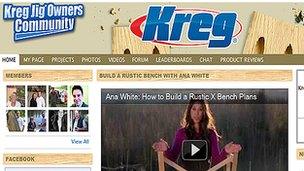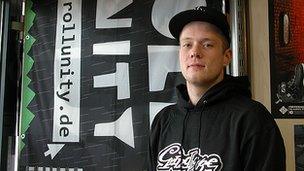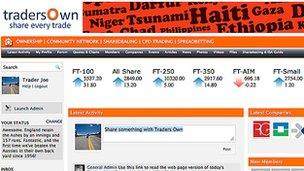Social science: Fancy building your own social network?
- Published

Becoming Mark: While Facebook founder Mark Zuckerberg probably doesn't have to worry quite yet, you too can build your own social network
"HSBC develops secret plan for 'own version of Facebook'" said the headline from communications industry publication PR Week.
The magazine claimed to have a leaked pitch document, external that laid out the banking giant's plans to create their own social network to rival the likes of Facebook.
The story was picked up by several newspapers and across the internet to a mixed reception. Or "Doomed" as one commenter on the original article predicted.
So it's perhaps just as well that the bank says things are not quite what they seem.
"There are no plans for the bank to introduce a social network", says James Thorpe, a spokesperson for HSBC.
According to Mr Thorpe the procurement department had decided the bank needed a list of preferred suppliers for social media services and had drawn up the document mentioned above. It got into the wrong hands and was misconstrued.
Although your bank's website might not seem like a natural fit for a place to share pictures of your cat, that doesn't necessarily mean that niche social networks, or community platforms as they're often known, have no place in your business plan.
Crafted social space

The Kreg Jig community lets users post photos, videos and talk about their projects
Derek Balsley of Kreg Tools certainly thinks they do. The company makes tools for DIY enthusiasts.
Their Kreg Jig community has over 35,000 members.
"On the community, we've been able to discover so many uses for our tools we weren't even aware of," says Mr Balsley.
"Our customers have opened our eyes to what the products we've made can really accomplish."
"That's been one of the neatest things - just to see all the amazing things the community members are creating, seeing the real world applications of those tools. Everything from Christmas decorations to huge tool sheds are being built with the same tools."
There have been other benefits.
"It's also great to see the interaction between beginners and really advanced woodworkers who normally would never have the opportunity to talk to each other.
"They have a lot of fun answering each other's questions. And overall questions we would normally answer. Our customer service is being done automatically online."
In terms of more tangible benefits, Mr Balsley says it's all about the longer term view.
"I think the larger picture is we get to provide our customers with a higher quality experience, a better experience with our tools, with our company.
"What happens is that they're more committed to our brand."
Rolling service
Roll Unity is a German rollerblading community, created by retailer Grindhouse Skateshop.

Heiko Woldstaedter: "Roll Unity makes it easy for users to communicate with others with the same interests"
"In our sport, where the scene is very small, it gives people a chance to communicate with others and meet people with the same interests," says Grindhouse's Heiko Woldstaedter.
"By building a community where people can come together and discuss rollerblading, it strengthens and promotes the sport in Germany."
As for the business case, Mr Woldstaedter says the brand is now at the heart of the conversation about aggressive skating.
"Roll Unity... has positioned Grindhouse as an integral part of the German roller-skating scene.
"We have a good reputation because we support the skaters and German roller-skating scene... We are proud that our customers come to us for advice."
Under construction
More and more businesses are creating their own communities. And when it comes to shopping for a provider, there's a lot of choice.
Jive Software and Lithium provide social business services aimed at the top end of the business market.
But creating your own community doesn't have to cost the earth.

Cristian Cussen: "Every Ning website looks different"
Palo Alto-based Ning powers over 100,000 "social websites" of all kinds, ranging from small groups of less than 250 users to large-scale networks.
This includes anything from family networks, to school groups, to special interest communities like Roll Unity to businesses and entertainers like Linkin Park and Radiohead.
"Making your website social has been for the last five years incredibly costly," says Cristian Cussen, Ning's European Managing Director.
"Most notable example is Martha Stewart, who spent about £2.5m trying to build her own social platform only to come over to Ning, where she spends £40 ($59.95) a month.
"We've basically tried to democratise this incredibly complex goal of quickly and with no technical prowess being able to make your website social."
There are options that allow you to charge for access or premium content, or to make money from advertising. Integration with mainstream social media is possible and top tier users can also have their own smartphone app.
"[Social networks like Twitter and Facebook] have a very unique problem, in that all these audiences are very disaggregated. Without the benefit of a central hub or website they don't have any way to centralise all of those audiences in one place."
Focus, focus
Alex Halliday would agree. He is chief executive of SocialGO, which has 40,000 sites on their platform.
"It's a great way of encouraging people to have a deeper engagement with the business... [and] an interesting way of leveraging your fans to effectively increase the network of people you have access to in your business."
But it's not as simple as just building it and expecting your community to come, says Mr Halliday.
"They've got have an objective. What is the purpose of the community? Is it to increase awareness of the brand, is it to help retain customers, build loyalty around the brand?"
He suggests having an early group of users who can help build the community, as well as ensuring someone is responsible for maintaining it.
"These things do take a lot of effort to get them to be really successful. But once they get up and running they can be amazingly beneficial for companies."
Proceed with caution
"It's not just about turning on and hoping it will go run. It requires significant marketing and content resources", says Jeremiah Owyang, industry analyst with Altimeter Group.

Traders Own is one of the business communities on the SocialGo platform
"For example Walmart created their own [community] called the Hub. It was a copy of Myspace and it did not work, it failed, they shut it within ten weeks.
"Why? Because they copied Myspace, they didn't create any differentiators."
He says there are several sound reasons to build a community.
"The first one is moving customers and prospects down the marketing funnel, so you engage them with attractive content, you're asking and answering questions and hopefully they come closer to conversion.
"It's about marketing and sales. And you can actually track leads and engagement."
Cost savings incurred as your community provides its own customer service is another reason according to Mr Owyang, as is a push to innovate.
"Companies like Dell are using these tools to innovate and to understand what the crowd is saying so they can build more and better products."
There are limits, however.
"There are some concerns that there will be social networking fatigue.
"If every single brand has a community where do we start and stop? So there needs to be healthy integration between existing social networks and these existing branded communities.
"You have to have both."